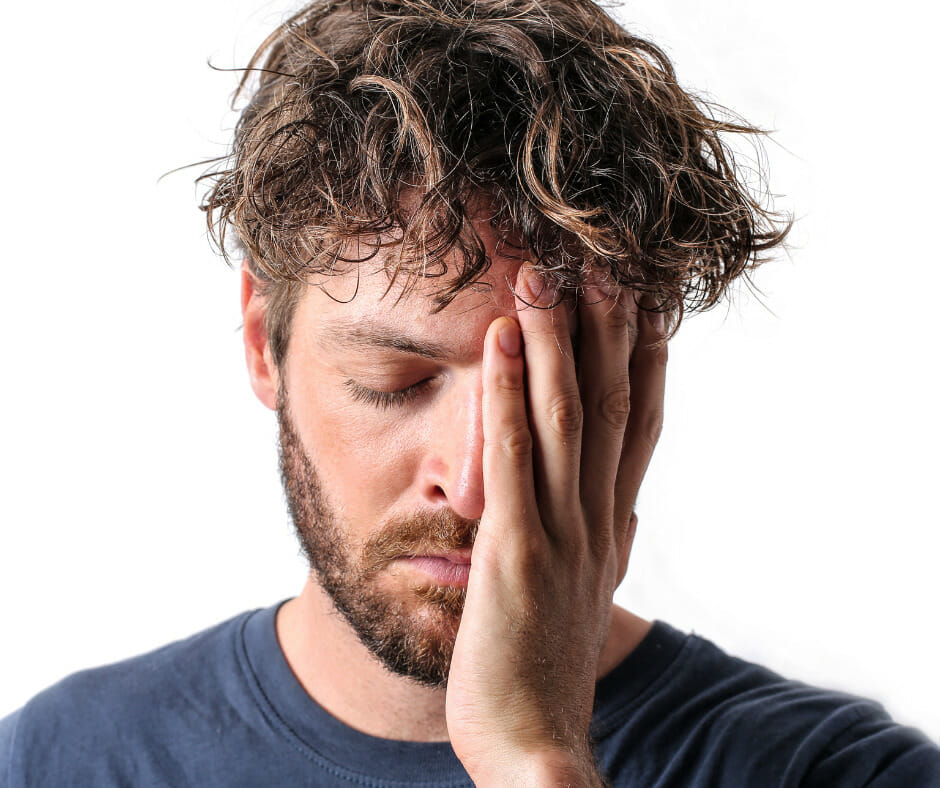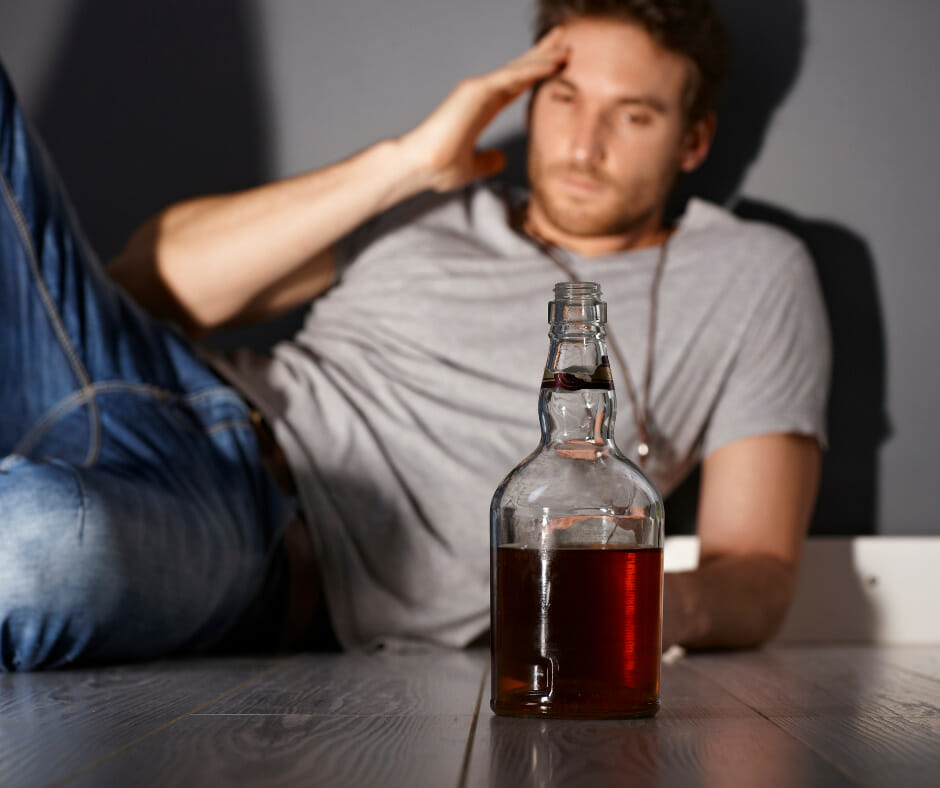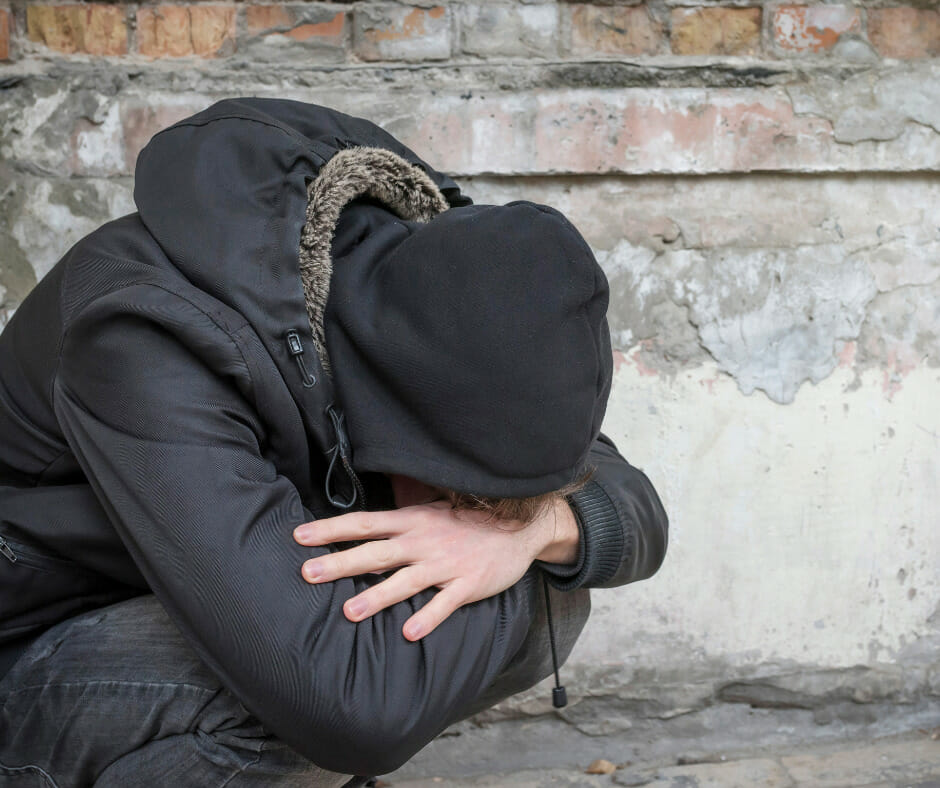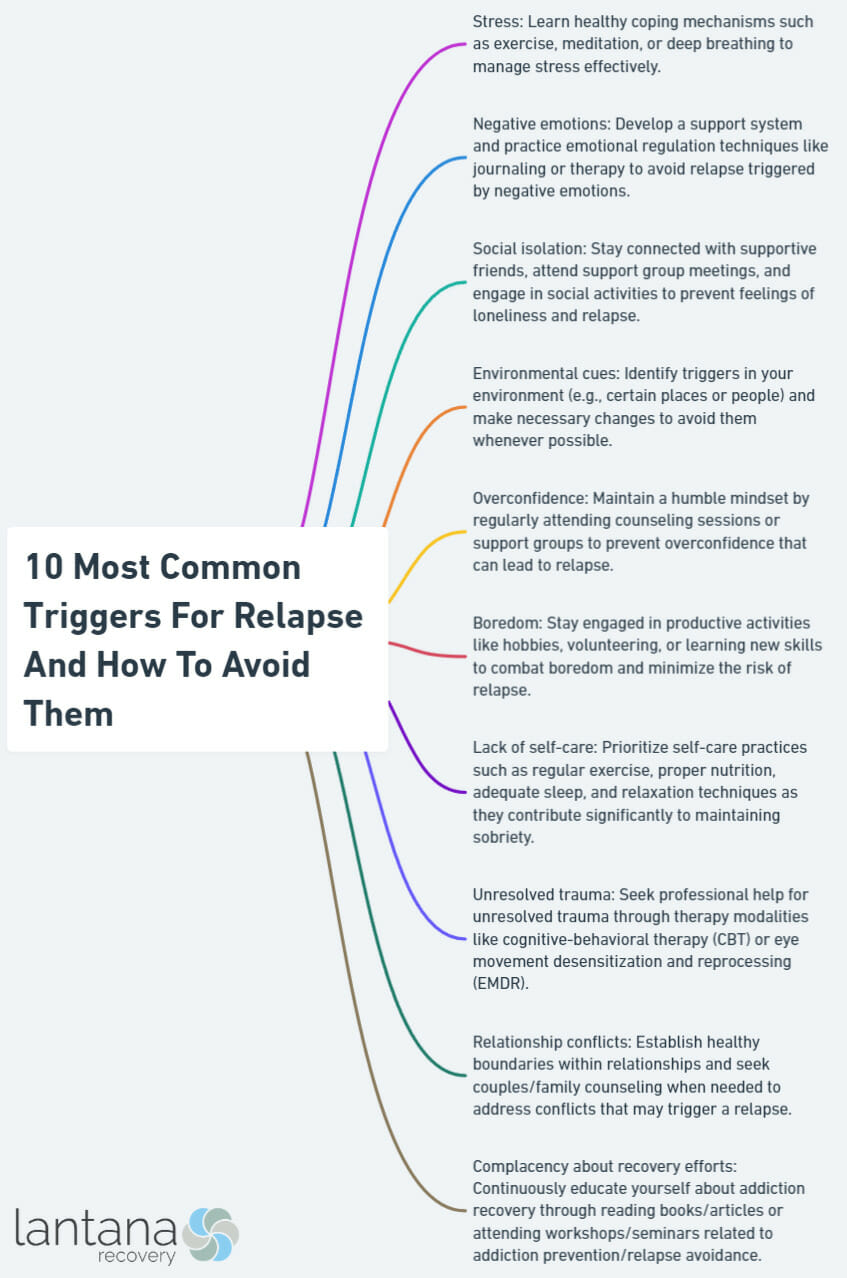Picture this: You’ve been working hard on your addiction recovery, making significant progress and feeling proud of your achievements. But then, unexpectedly, an old friend invites you to a party where substance use is likely to occur. The situation is daunting, and you’re unsure how to handle it. This scenario is all too common for those in recovery, making it crucial to understand and manage relapse triggers. In this blog post, we’ll explore the top 10 most common triggers for relapse and provide strategies for avoiding them, ensuring you’re well-equipped for sustained sobriety.
Key Takeaways
- Identify and understand common relapse triggers to stay motivated on your recovery journey.
- Develop healthy coping mechanisms, create supportive networks, and proactively address emotional turmoil for successful sobriety.
- Utilize a personalized relapse prevention plan with professional help from Lantana Recovery for the best chance of long term success in addiction treatment.
Understanding Relapse Triggers

Relapse triggers are events, situations, or emotions that can lead to a strong desire to seek out drugs and alcohol again, potentially resulting in alcohol abuse. These addiction relapse triggers can vary from person to person and can be incredibly powerful, leading to an increased risk of addiction relapse.
Identifying and managing your triggers is a pivotal step. Recognizing and addressing these common relapse triggers allows for proactive management, thus reducing the likelihood of reverting to substance use.
Dealing with mental relapse and understanding emotional relapse involves a constant internal battle between abstinence and temptation. Physical relapse, on the other hand, includes experiencing withdrawal symptoms from the absence of drugs and alcohol. In either case, understanding your triggers forms a significant part of a successful recovery journey.
Types of Relapse Triggers

Relapse triggers can be categorized into two main types: internal and external. Thoughts and emotions can lead someone to use drugs or alcohol. Such triggers are called internal triggers. These triggers can be challenging to manage, as they require taking control of emotions and thoughts.
On the other hand, external triggers are people, places, and objects that remind you of past substance abuse and reinforce the desire to use drugs or alcohol. Effectively dealing with both internal and external triggers plays a significant role in maintaining your recovery goals.
When it comes to external triggers, active avoidance of certain places, breaking ties with specific individuals, and taking other conscious steps to limit exposure are advised. In contrast, managing internal triggers may involve developing healthier coping mechanisms and seeking professional help to better understand and process negative emotions.
Top 10 Common Relapse Triggers

Here are the top 10 common relapse triggers you might encounter during your recovery journey. Understanding these triggers can help you stay motivated and on track with your recovery goals, ultimately leading to a healthier, happier life.
Stress and Anxiety
Stress and anxiety can be major contributors to cravings and relapse. It could be due to:
- health issues
- taking on more responsibility
- having a strained relationship with someone close to you
- running late for work
When stress levels rise, the brain’s prefrontal cortex, responsible for cognitive control and stress regulation, is inhibited, making it harder to manage impulses and make informed decisions.
Developing healthy coping mechanisms is the key to effectively managing stress and anxiety. Mindfulness, exercise, and talking to a therapist or support group are all great ways to help manage stress in a healthy way. By addressing stress and anxiety head-on, you’ll be better equipped to resist the temptation of drugs or alcohol.
Social Pressure
Social pressure can be a significant risk factor for relapse if you’re not adequately prepared to confront it. This can involve:
- Reconnecting with old relationships can cause strong urges or cravings to use them again
- Social isolation, which can be detrimental to your recovery journey
- Prolonged loneliness and a lack of support
- Exacerbation of underlying mental illnesses
Establishing a supportive network of:
- family
- friends
- sponsors
- other members of the addiction recovery community
is an effective way to safeguard against social pressure. Additionally, setting boundaries in relationships can help protect against overwhelming emotions that could lead to a relapse.
La Bere’s 2020 research highlights that to start making changes toward sobriety, people with Alcohol Use Disorder (AUD) need to recognize the harmful effects of alcohol on their social surroundings, including their family, community, and work. By understanding the impact of social pressure on relapse and proactively creating a supportive network, you can ensure success in recovery.
Emotional Turmoil
Emotional turmoil is a set of intense emotions such as sadness, depression, and anger, which can be a trigger for an emotional relapse. When in a good mood, some people may crave to feel even better. On the other hand, someone may experience cravings while feeling low or sad. Negative emotions like sadness, depression, guilt, loneliness, and anger can all be potential triggers for relapse. It’s crucial to address these negative feelings to prevent an emotional relapse.
Developing strategies for processing and navigating difficult emotions is vital to prevent emotional turmoil from leading to a relapse. This might include seeking professional help, such as therapy or counseling, to better understand and manage these emotions. By proactively addressing emotional turmoil, you can maintain your sobriety and continue on your recovery journey.
Boredom
Boredom can be a slippery slope if you’re not ready to tackle it head-on. In early recovery, boredom and social isolation can be powerful triggers for relapse. When feeling bored, individuals may be more likely to seek out activities or substances that provide temporary relief or excitement, leading to a return to addictive behaviors.
Staying proactive by finding new, enjoyable activities and avoiding overwhelming feelings is an effective way to combat boredom. Engaging in fulfilling activities that replace substance use can help you stay on the right track and maintain your sobriety.
Physical Pain

Physical pain, whether it be chronic pain or pain from an injury or physical illness, can be a powerful relapse trigger if you’re not adequately prepared to manage it. “Pain presents a significant public health concern that is estimated to cost at least $560–635 billion USD annually due to lost productivity and health care costs.” (Pain as a risk factor for substance use, Voon et al., 2018.) Pain can significantly increase the risk of relapse, as individuals may be tempted to seek relief through substance use.
Dealing with physical pain calls for the exploration of non-addictive pain management techniques and insistence on non-addictive prescriptions when necessary. By managing pain effectively without resorting to addictive substances, you can maintain your recovery and avoid relapse.
Exposure to Substances
Exposure to substances can lead to relapse if you’re not adequately prepared to handle it. This could involve:
- seeing an old friend you used to do drugs with
- visiting certain places that remind you of your addiction
- coming across specific objects associated with drug use
All of these situations could potentially lead to a relapse if you’re not prepared.
Proactively avoiding high-risk situations and staying away from reminders of past substance use is key to minimizing the risk of relapse due to exposure to substances. By being aware of your triggers and taking conscious actions to limit your exposure, you can stay on the path of recovery.
Reminders of Past Use
Reminders of past drug and alcohol use, such as seeing an old friend you used to do drugs with, certain places that remind you of your drug addiction, or even specific objects associated with drug abuse, can be potential triggers for relapse. Nostalgia for substance abuse can be particularly dangerous when you reflect on past substance use with a distorted, overly positive view.
Awareness of potential triggers and reaching out to your support system when needed can help overcome the challenges posed by reminders of past use. By staying vigilant and seeking help when necessary, you can continue your recovery journey and avoid the pitfalls of relapse.
Major Life Changes
Major life changes, like moving to a new city, beginning a new job, getting married, or experiencing the loss of a loved one, can have a powerful effect on relapse rates for those struggling with addiction. These changes can cause stress, anxiety, and uncertainty, which can lead to cravings and make it harder for individuals to cope with their addiction.
Awareness of these risks and proactive communication with your treatment team and support network can help manage relapse triggers during major life changes. By developing adaptive coping skills and practicing self-care during transitions, you can continue on your path to recovery and avoid setbacks.
Overconfidence in Recovery
Overconfidence in recovery can be dangerous, as it can lead to a false sense of security, making you more likely to take risks and eventually relapse. It’s important to remain conscious of the fact that addiction is a chronic illness, and relapse is always a possibility.
Staying humble in addiction recovery can help prevent overconfidence and the potential for relapse. By remaining vigilant and dedicated to your sobriety, you can reduce the risk of falling back into old patterns and maintain your hard-earned progress.
Strategies for Managing Relapse Triggers

Developing self-awareness, honing coping skills, and utilizing support systems are effective strategies for managing relapse triggers after exploring relapse and its coping strategies. Self-awareness is the power to recognize and comprehend one’s own emotions, thoughts, and behaviors. By understanding your triggers, you can take steps to stay away from them and manage relapse triggers more effectively.
Having a support system is invaluable in providing the support and guidance you need to achieve a successful recovery. Your support system can include:
- Family
- Friends
- Sponsors
- Other members of the addiction recovery community
In addition to self-awareness and support, seeking professional help, like therapy or counseling from experts at Lantana, can also be beneficial in managing triggers and maintaining sobriety.
The Importance of a Relapse Prevention Plan

A relapse prevention plan is an essential tool in sustaining sobriety and avoiding setbacks in the recovery journey. Creating and adhering to a personalized relapse prevention plan can help in reducing the risk of reverting to substance use.
Committing to an addiction treatment program for its entire duration can help you develop the necessary skills to manage triggers before re-entering mainstream life, where there is less structure and monitoring. Individuals who stay in addiction treatment for a longer period of time (90 days or more) are more likely to maintain their sobriety in the long run.
Seeking Professional Help

Seeking professional help when faced with challenges during your recovery journey is paramount. Therapy, counseling, and support groups are all great resources to help you on your path to recovery, offering essential tools and resources needed to maintain sobriety.
In addition to seeking professional help from an institution like Lantana, taking a holistic approach to treatment can also be beneficial in managing triggers, challenging life circumstances, and emotional difficulties that may arise after rehab. By focusing on improving your overall health, not just your addiction, you can further enhance your chances of a successful and lasting recovery.

Summary
In conclusion, understanding and managing relapse triggers are crucial elements of a successful addiction recovery journey from relapse. By recognizing the most common triggers, developing healthy coping mechanisms, creating a relapse prevention plan, and seeking professional help when needed, you can maintain your sobriety and continue on your path to a healthier, happier life. Remember, the road to recovery may be challenging, but with dedication, perseverance, and the right tools, you can overcome these obstacles and build a brighter future.
Frequently Asked Questions
What are the top 3 factors that contribute to relapse?
Relapse is often caused by dangerous places, people, and thoughts. We must be aware of these potential triggers to maintain our recovery journey and stay on the path of sobriety. It is important to recognize these triggers and take steps to avoid them. This could include avoiding certain people or places or engaging in activities that help to distract.
What are relapse triggers in psychology?
Relapse triggers are social, psychological, and emotional situations and events that may lead an addicted person to seek out their substance of choice and ultimately relapse.
These triggers can vary from person to person, but some common examples include stress, boredom, loneliness, and feeling overwhelmed. Other triggers may include seeing people who use drugs, being in certain places, or even certain smells or sounds.
What are the 5 causes of relapse?
Relapse can be caused by a variety of things, such as withdrawal, mental health issues, associating with people, places, and things that trigger cravings, poor self-care, relationships and intimacy, pride, and overconfidence. All of these can contribute to a higher risk of relapse.
How can I manage stress and anxiety during my recovery?
Take positive steps to manage your stress and anxiety, such as mindfulness, exercise, and speaking to a therapist or support group. This will help you successfully recover.
What is the importance of a relapse prevention plan?
Creating a relapse prevention plan is key to increasing the likelihood of long-term sobriety, as it allows for identifying and managing triggers and cravings, building up coping skills, and decreasing the risk of relapse.
By creating a plan, individuals can identify their triggers and cravings, and develop strategies to manage them. They can also build up their coping skills to help them better handle difficult situations. Finally, they can reduce their risk of relapse by understanding their triggers and cravings and having a plan in place.









